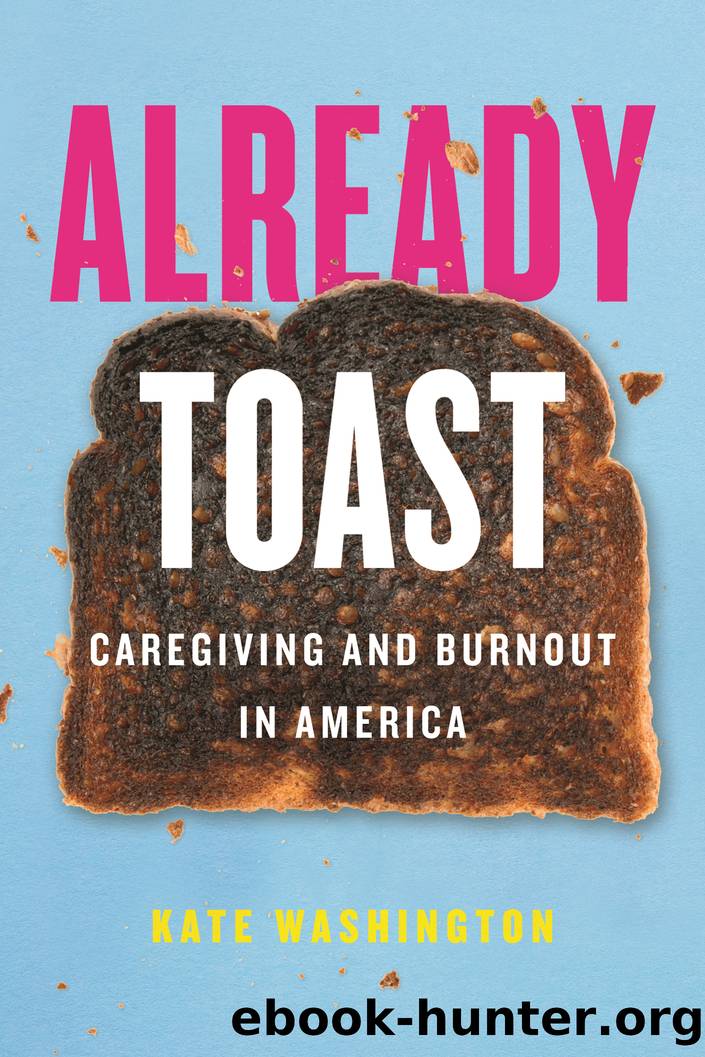Already Toast by Kate Washington

Author:Kate Washington [Washington, Kate]
Language: eng
Format: epub
Publisher: Beacon Press
Published: 2021-09-15T00:00:00+00:00
THE VALUE OF CARE
The necessary work of family caregivers has enormous worth; remember that AARP estimate of the market value of unpaid care labor in at a staggering $470 billion? That figure comes from an estimated 37 billion hours of care, calculated at an hourly wage of just over $12.23 This figure reflects an average of about sixteen hours per week spent on care. Many caregiversâ roles demand far more time; mine certainly did. The healthcare system depends on this kind of care for countless vulnerable patients.
Despite the obvious value of this work there is no remuneration for most American caregivers. The time spent helping a family member is typically uncompensated by public programs or insurance, though there are states with programs offering caregivers economic support. Some families arrange to pay a family member by pooling resources. But our healthcare system and government programs do little, and in most cases nothing, to support caregivers. As Gail Sheehy (writing before passage of the Affordable Care Act) noted in her Passages in Caregiving: âInstead of subsidizing people who quit their jobs to take care of their loved ones, the government has slashed Medicare benefits and funding for home-health-care agencies.â24 Many agencies and insurance companies have also shifted care-related costs to families. The only benefit federally guaranteed to family caregiversâand then only to those who work for companies with more than fifty employeesâis twelve weeks of unpaid leave per year via the Family and Medical Leave Act. FMLA (at which I look more closely, along with other legal resources for caregivers, in the conclusion) provides a little relief in terms of time but constitutes a de facto economic penalty for those workers who can afford to take it. Moreover, itâs not available to all workers, and in any case isnât enough to meet the care needs of ongoing disability or eldercare, chronic illness, or someone suffering a major health crisis. âOur country has not yet recognized the importance of providing paid family leave,â says Lynn Feinberg of AARP. âMost family caregivers who are caring for someone whoâs seriously ill or has a disability canât afford to stop out of the workforce without getting a paycheck.â25
In 2020 an emergency expansion of FMLA, called FFCRA (Families First Coronavirus Response Act), required some employers to offer paid leave for coronavirus-related reasons such as self-quarantining or caring for a quarantined individual, but this expansion was temporary, lasting only to the end of the year.26 Moreover, as Joan C. Williamsâdirector of the Center for WorkLife Law at the University of California, Hastings, College of the Lawâpointed out in an August 2020 New York Times op-ed primarily focused on childcare, âFiguring out whether youâre eligible for Families First is so complicated that a chart explaining the program looks like a game of Chutes and Ladders.â Williams reports that a spike in calls to her centerâs legal-resource hotline âmake it clear that Families First is falling short.â27
Even before the pandemic highlighted the need for better policies around family leave and
Download
This site does not store any files on its server. We only index and link to content provided by other sites. Please contact the content providers to delete copyright contents if any and email us, we'll remove relevant links or contents immediately.
Periodization Training for Sports by Tudor Bompa(8239)
Why We Sleep: Unlocking the Power of Sleep and Dreams by Matthew Walker(6686)
Paper Towns by Green John(5166)
The Immortal Life of Henrietta Lacks by Rebecca Skloot(4567)
The Sports Rules Book by Human Kinetics(4369)
Dynamic Alignment Through Imagery by Eric Franklin(4200)
ACSM's Complete Guide to Fitness & Health by ACSM(4043)
Kaplan MCAT Organic Chemistry Review: Created for MCAT 2015 (Kaplan Test Prep) by Kaplan(3994)
Livewired by David Eagleman(3757)
Introduction to Kinesiology by Shirl J. Hoffman(3753)
The Death of the Heart by Elizabeth Bowen(3596)
The River of Consciousness by Oliver Sacks(3590)
Alchemy and Alchemists by C. J. S. Thompson(3505)
Bad Pharma by Ben Goldacre(3414)
Descartes' Error by Antonio Damasio(3263)
The Emperor of All Maladies: A Biography of Cancer by Siddhartha Mukherjee(3135)
The Gene: An Intimate History by Siddhartha Mukherjee(3086)
The Fate of Rome: Climate, Disease, and the End of an Empire (The Princeton History of the Ancient World) by Kyle Harper(3048)
Kaplan MCAT Behavioral Sciences Review: Created for MCAT 2015 (Kaplan Test Prep) by Kaplan(2973)
